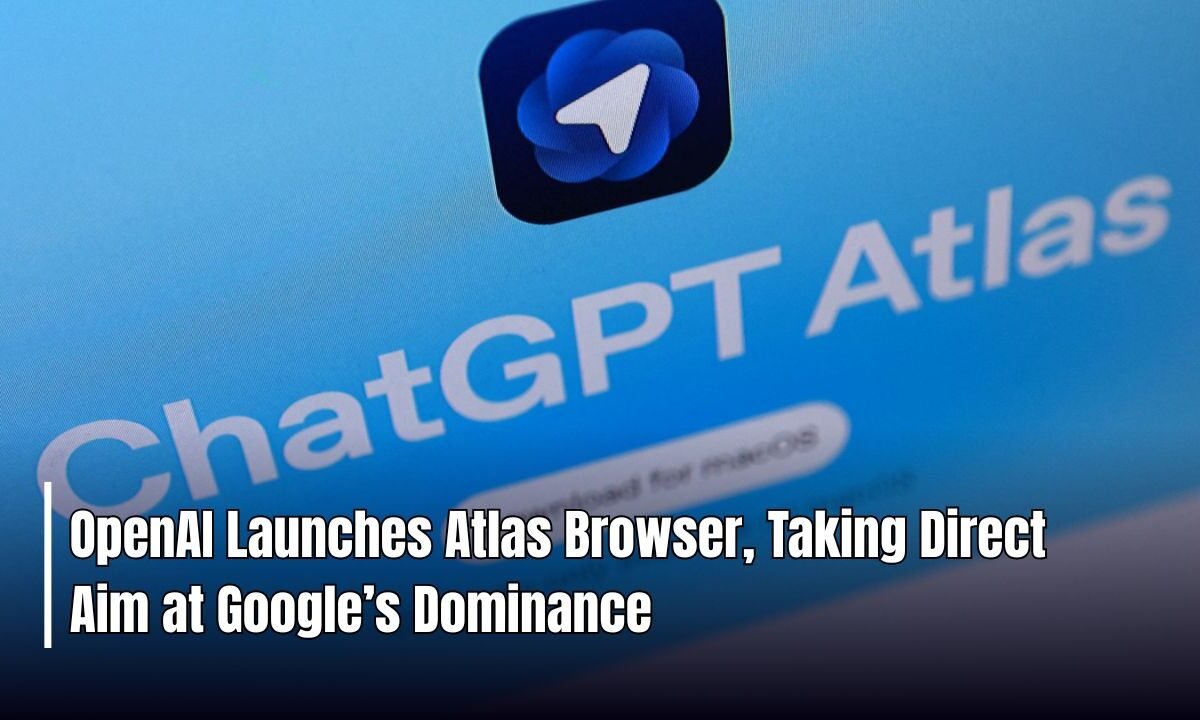On Tuesday, OpenAI introduced ChatGPT Atlas, a long-awaited web browser powered by its well-known chatbot.
This move directly challenges Google Chrome’s market dominance and signals a new chapter in how users engage with the internet.
What is ChatGPT Atlas?
ChatGPT Atlas is a browser built around the chatbot experience. It offers a sidebar feature that allows users to:
- Summarize content from any web page
- Compare products across websites
- Analyze data in an integrated way
In addition, its premium “agent mode” lets ChatGPT act on websites on behalf of the user — performing tasks like researching a trip, filling forms, or making purchases automatically.
Why This Launch Matters
Leveraging an 800 Million Weekly User Base
OpenAI already boasts around 800 million weekly active users for its ChatGPT service. This launch allows the company to tap deeper into users’ online behavior and browser habits, broadening its presence in their digital lives.
Shifting Toward AI-Driven Search
Rather than relying solely on keyword-based searches like those offered by Google, more users are turning to conversational AI tools that can synthesize information and act proactively. Atlas could accelerate that trend, intensifying the competition between OpenAI and Google.
Impact on Market Leaders
Shares of Alphabet Inc. (parent company of Chrome) fell 1.8% following the launch announcement. This suggests growing investor concern that OpenAI’s browser could disrupt traditional search and browser advertising models.
Competitive Landscape
ChatGPT Atlas enters a crowded field. Other browsers and services such as Comet (by Perplexity AI), Brave Browser and Opera Neon have already introduced AI-enhanced tools.
These platforms offer features like summarising web pages, auto-form-filling and code drafting — as companies race to integrate conversational AI into browsing.
Key Features of Atlas
- A ChatGPT sidebar accessible in any browser window for summarisation, comparison and data-analysis tasks.
- Agent mode (currently for paid users) that enables ChatGPT to interact on a website’s behalf — including purchasing ingredients for a recipe.
- A live demo showed ChatGPT fetching a recipe online, navigating to the grocery-site Instacart and adding all necessary items to the cart — fully autonomously.
- Initial release is globally available on Apple’s macOS; versions for Windows, iOS and Android are expected soon.
Company Strategy and Market Response
Under the leadership of Sam Altman, OpenAI shook up the tech industry with the launch of ChatGPT in late 2022. Since then, it has faced fierce competition from Google and Anthropic, prompting it to explore new growth avenues.
Meanwhile, Google has responded to evolving search behaviors: certain queries now show an AI “overview” alongside traditional search results, and its AI model Gemini has already been integrated into Chrome in the U.S., with iOS integration planned next.
Legal & Market Position
In a favorable development for Google, a federal judge in September ruled that Google need not sell the Chrome browser. Judge Amit Mehta noted that heavy investment in generative AI by tech giants and startups undermines traditional search models, making Google’s partner-payment strategy more acceptable.
Despite mounting competition, Chrome still dominates with a 71.9% global browser market share as of September. This provides Google a solid foundation — yet analysts warn that the arrival of Atlas could begin to slice into advertising dollars traditionally captured by Google’s search business.
Implications for Search Advertising
Analyst Gil Luria of D.A. Davidson points out that embedding chat into a browser is likely a precursor to OpenAI monetising by selling ads. Since Google currently captures nearly 90% of the global search-ad spending, any shift by OpenAI into this space could threaten Google’s ad dominance.
The release of ChatGPT Atlas marks a significant milestone in the evolution of web browsing.
By integrating advanced conversational AI into a browser environment, OpenAI is setting the stage for more interactive, proactive online experiences — and applying pressure on reigning players like Google.
With the potential to reshape how users search, browse and transact online, the competitive landscape of the browser and search industry may be poised for meaningful change.




